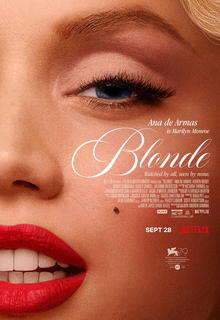

Blonde (Andrew Dominik, 2022) wr. Andrew Dominik from novel by Joyce Carol Oates, dp Chayse Irvin; Ana de Armas, Adrien Brody, Bobby Cannavale, Xavier Samuel, Julianne Nicholson; 166 min.
Wikipedia:
Reviewing the film following its world premiere at Venice, where it received a fourteen-minute standing ovation, Catherine Bray of Empire praised Dominik's visual style and de Armas' performance, but found the film failed at demystifying Monroe's life, writing: "The portrait that this film paints of Monroe depicts a little girl lost, who repeatedly calls her lovers 'Daddy' and reacts to almost every new setback with the same tremulously teary ingénue's pout." Vanity Fair's Richard Lawson found it a "fascinating alternative to the traditional biopic", commending the unconventional storytelling, direction, and de Armas' performance. Owen Gleiberman of Variety called de Armas' work "a performance ... of breathtaking shimmer and imagination and candor and heartbreak." Deadline Hollywood's Damon Wise stated the film is an "astonishing" way to tell Monroe's life in a fictional sense, as it is "presented as a horror movie in the surreal, nightmarish style" comparable to the films of David Lynch, especially Mulholland Drive (2001).
David Rooney of The Hollywood Reporter called it "a must-see", yet also "a work of such wild excesses and questionable cruelty". In GQ, Jack King's review also noted how the film shifts from a "traditional biopic" to "a movie unrelenting in its brutality". The Guardian's Leslie Felperin described the film as "ravishing, moving and intensely irritating" but ultimately "all a bit much", and assigned it a rating of three stars out of five. In a mixed review for IndieWire, Sophie Monks Kaufman called the film a "bizarre, miserablist biopic", admiring de Armas' performance and the cinematography, but criticizing Dominik's portrayal of Monroe: "Dominik critiques the world for reducing his subject down to her topline assets—and then treats her in exactly the same way. His Marilyn is a sexy, breathy blonde with daddy issues. And that's all, folks."
The New York Times critic Manohla Dargis panned the film, criticizing the fact that "once again a director is more interested in examining [Monroe's] body (literally, in this case) than getting inside her mind" and writing "Given all the indignities and horrors that Marilyn Monroe endured during her 36 years, it is a relief that she didn't have to suffer through the vulgarities of Blonde, the latest necrophiliac entertainment to exploit her." In his negative review, Justin Chang from the Los Angeles Times stated that the film "isn't really about Marilyn Monroe. It's about making her suffer." He also opined that the film "turns Marilyn Monroe into an avatar of suffering, dwelling on her pain so obsessively that even the film's fleeting moments of empathy feel like another form of exploitation". "At times, the movie feels like a slaughterhouse seen from the animal's point of view" wrote Bilge Ebiri in his review for Vulture, remarking on the film's tendency to elicit strong reactions and emotions from an audience by putting together what he described as a "captivating and terrifying" jigsaw puzzle of Monroe's life. Anthony Lane, in his review for The New Yorker, praised de Armas' performance and Dominik's visual style, but heavily criticized his portrayal of Monroe, ultimately concluding: "Bedazzling, overlong, and unjust, Blonde does a grave disservice to the woman whom it purports to honor." In a negative review for Slant Magazine, Jake Cole echoed Lane's sentiment, stating: "Blonde…is the worst kind of feminism, one so absorbed in the desire to 'save' a woman that it victimizes her as much as possible to make its redemption of her that much more praiseworthy." Writing for Time, Stephanie Zacharek criticized Dominik for allowing "no room for the real-life Marilyn's multidimensionality", asserting that "Marilyn—the brilliant, perceptive if often difficult performer—is almost nowhere to be seen in Andrew Dominik's willfully clueless Freudian fantasy Blonde".
Luke Buckmaster:
It might not be narratively interesting to say that Presley and Monroe died from addiction to very powerful and dangerous drugs, like many of their kind since then—from Michael Jackson to Prince, Whitney Houston and Heath Ledger. Unless of course that turns into a commentary about who or what caused their addiction, with all of us as suspects. It was the audience. It was the media. It was the producers. It was the broken ideals of a corrupt society. The origins of the term “star” imply an act of looking up and observing a force larger than ourselves. The lives (and deaths) of famous people must mean something, because if theirs don’t, neither do ours. flicks.com.au.
Wikipedia page.
Garry Gillard | New: 4 October, 2022 | Now: 5 February, 2023